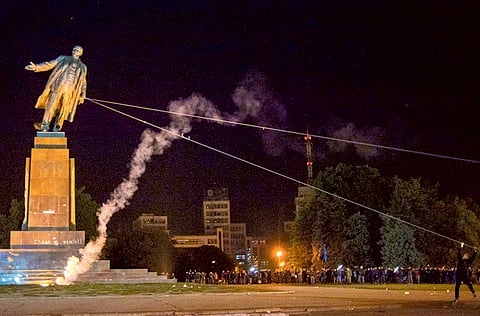Ukraine troop withdrawal in doubt after 12 killed
Activists in second largest city topple statue of Lenin

Kiev: The shaky truce between pro-Russian rebels and the Ukrainian military was challenged on Monday when 12 soldiers and civilians were reported killed in a surge of fighting across the separatist east.
A week after talks in the Belarussian capital Minsk yielded an agreement for a ceasefire and the withdrawal of heavy weapons and troops from the frontline, a lasting solution to the conflict which has killed more than 3,200 people seemed no closer.
National Security and Defence Council spokesman Andriy Lysenko said rebels had killed nine soldiers over the last 24 hours. Some died in a rebel attack on an armoured vehicle carrying Ukrainian paratroopers.
Three civilians were killed in the main rebel stronghold of Donetsk, according to city hall.
A Russian army delegation of some 70 people arrived last week in eastern Ukraine, headed by the deputy commander of Russian ground forces Alexander Lentsov.
Several members of the delegation travelled to Donetsk to urge the separatists to respect the truce.
“We are going to convince [the rebels], use reason with them. That is the most important thing,” Lentsov told Ukrainian television at the weekend, in rare public remarks by a Russian military commander.
Moscow denies it has ever sent regular troops to eastern Ukraine but Kiev argues that large contingents of soldiers and heavy equipment from Russia were behind a rebel offensive last month that seized control of a large chunk of territory and forced Kiev to agree to a ceasefire.
The European-brokered deal finalised a week ago in Minsk commits the Ukrainian army and the rebels to stop firing and establish a 30-kilometre (18-mile) buffer zone between the warring sides.
Ukrainian President Petro Poroshenko stressed that the army would continue fighting if the insurgents failed to silence their guns.
“In 100 days we have saved and reinforced the state,” he said on Sunday in an address on his first 100 days of office, adding that the army has created a “reliable frontline” in the east.
Military officials said on Monday separatists in tanks staged repeated attacks on a strategic flashpoint on the outskirts of the largest city in the war zone.
“Ukrainian soldiers have repelled the attacks,” the statement said.
In a highly symbolic act, activists in Ukraine’s second largest city of Kharkiv, an eastern hub of 1.5 million which avoided the conflict after an initial outbreak of unrest, toppled the country’s largest statue of Bolshevik revolutionary Vladimir Lenin in the main square.
Kharkiv, which lies city close to the Russian border, is considered by Moscow as culturally Russian and President Vladimir Putin declared it part of “Novorossiya” (New Russia), which according to him became part of Ukraine artificially in the early 20th century.
Statues of Lenin, seen as symbols of the totalitarian Soviet past, were toppled throughout central Ukraine, including Kiev, during last winter’s pro-Europe protests, which led to the ouster of the unpopular former president Viktor Yanukovych.
“Lenin? Let him fall. As long as people are not injured. As long as this bloody Communist idol does not add to the toll of his victims,” Interior Minister Arsen Avakov wrote on his Facebook page, as a criminal case into the destruction of cultural monuments was closed despite an outcry from Ukraine’s Communist party.
The latest felling of a statue in the important Russian-speaking city is viewed as a symbolic gesture towards Moscow, which Ukraine blames for disorder in the east.
The five-month conflict between Kiev and the separatists of Lugansk and Donetsk has pushed Western states to impose unprecedented sanctions on Russia, whose economy is already flatlining.
Striking a more conciliatory tone, Russian Foreign Minister Sergei Lavrov on Sunday lamented the deterioration of Moscow’s relations with Washington after US President Barack Obama denounced “Russian aggression in Europe” in a speech to the United Nations last week.
“We absolutely have an interest in normalising these relations,” Lavrov said.
“What’s needed is something that the Americans will call a ‘reset’,” he told Russian television, referring to the 2009 Washington-led drive aimed at improving ties.


